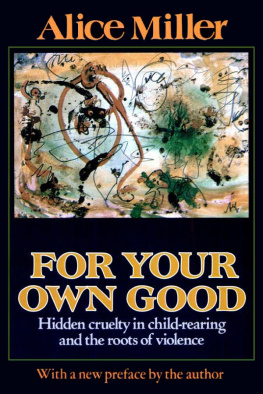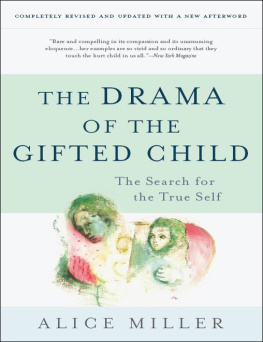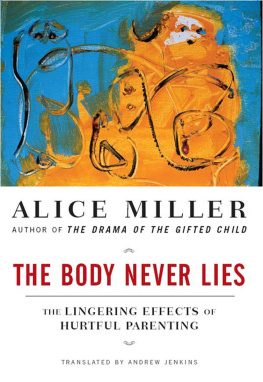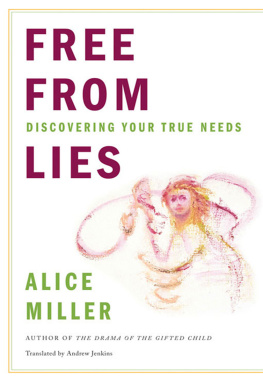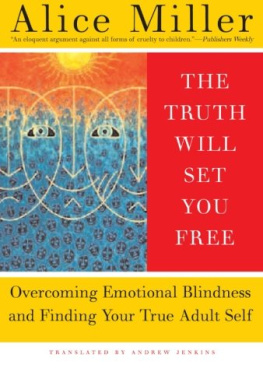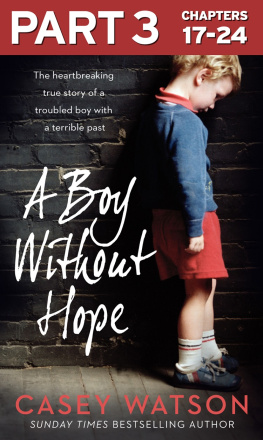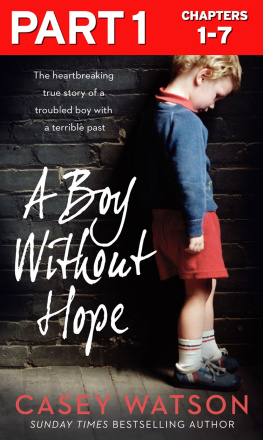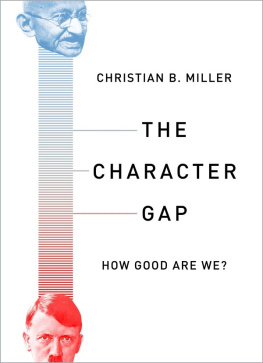T HIS BOOK appeared twenty-two years ago, when child abuse was not an issue. People were shocked at my description of what I called poisonous pedagogy; they had thought that children were subjected to this kind of maltreatment, lies, hypocrisy, and manipulation only in Germany, and not within the past hundred years. Then the media began to bring to light appalling facts about what happens today to children in other countries as well. Books that showed poisonous pedagogy at work even in contemporary America started to appear (see especially Spare the Child by Philip Greven, Knopf, 1991).
Since then we have become more and more aware of what happened to us in our own childhoods, and we have begun to learn about the lifelong consequences of the first years of life. As the sociologist Lucien Lombardo wrote in his introduction to a chapter of my recent book, The Truth Will Set You Free , childhood is not the shortest age in our life but rather the longest because it stays with us until our death. In a way he is right: irrational emotions like fear and rage stemming from our childhoods can lead to crime or lifelong suffering if we dont take care of them and are not interested in their origins. Fortunately, today we can work on our unconscious and overcome our fears; we can achieve emotional health if we dont deny the causes of our plight. Amazingly, we can be more truly alive once we know what happened to us at the beginning of our lives and are able to find conscious access to the children we once were.
On the other hand, some people try so hard to eradicate all memories, to avoid any confrontation with the tortured, humiliated child they were that they die psychically long before their physical deaths, sometimes at the expense of their children and other people. This avoidance, this denialoften accomplished with the help of drugsis comprehensible, of course, as long as the pain seems unbearable to us. But it is not. It was unbearable only for the infant who needed to deny in order to survive. Adults can live with the truth. The price they pay for their denial can be very high.
The biggest obstacle for parents of goodwill is their ignorance concerning the humiliation endured in their own childhoods. A survey concerning physical punishment of children was recently done in France, one of the most civilized and culturally rich countries in the world. One hundred young mothers from different backgrounds were asked at what age they had assumed that their first child needed spanking. Eighty-nine percent of the women answered that when the child started to walk or crawl and to reach for objects that might be dangerous, spanking was necessary to teach them how to behave. The remaining II percent couldnt remember the exact age their children were when they started to spank them. Not a single mother said that she had never spanked her child.
The results of this survey didnt surprise me. Of course, I know that there are people who never beat their children. But these parents are an exception; they represent perhaps about 3 percent of all parents in the world (see Olivier Maurel, La Fesse , Editions La Plage, 2001). If a survey done in the country that for more than two hundred years has propagated the ideals of equality and brotherhood yields these sad results, what can we expect from countries only now gaining access to important information about the history of childhood? Our collective ignorance about the sources of violence remains gigantic.
Some may ask why I focus so strongly on the issue of corporal punishment when there are so many other forms of child abuse and exploitation. Why has this become my chief cause?
First of all, the harm it does is tragically underestimated all over the world. Nobody today would deliberately recommend verbal humiliation, manipulation, and exploitation of children for their own good. But many people seriously believe that spanking is of some good to children. And corporal punishment includes the effects of all other forms of child abuse: betrayal of the childs confidence, dignity, and perception of reality. Finally, I emphasize corporal punishment because of the essential role of the body in transmitting information to the next generation. The body stores up in its cells what it has endured from the moment of conception, a phenomenon Olivier Maurel has explained very clearly (see his comments under Dangers spcifiques des chtiments corporels on my Web site, www.alice-miller.com ). The memory of the body underlies the mystery of the compulsion to repeat, especially the compulsion of so many adults to repeat with their own children what they endured very early in life but do not recall.
We are reluctant to acknowledge that the memory of our bodies, along with our emotional experience, is not controlled by our consciousness, our mind. We have no control over the way this memory operates. But accepting the sheer existence of these phenomena can help us to guard against their effects. The typical mother who involuntarily slaps her child is not aware of the fact that her body and its memory is prompting her to do so. But she can come to understand this, and to understand means to be able to cope, rather than to repeat, endlessly and helplessly, a behavior that harms all involved.
Teachers and parents of the last two centuries, a number of whom I quote in this book, have emphasized again and again that the school of obedience, of physical admonition, should start very early in the life of a child, so that the message remains effective for his or her whole life. As the aforementioned French survey attests, this advice is still followed: children are beaten, and at the very time when it is most damaging to them. During the first three years of life, the childs brain grows very fast. The lessons of violence learned at this time are not easy to dissolve. Children must deny the pain in order to survive, but this strategy leads them, as grown-ups, to the emotional blindness responsible for the absurd attitude they act upon as parents and educators. The denial of violence endured leads to violence directed toward others or oneself.
I, of course, was no exception, and it took me a long time to free myself from this denial. The awakening of my emotions and memories through painting, which I took up in 1973, motivated me to look at different childhoods in different cultures. Through this research I learned how evil comes into the world and how we produce it in every new generation again and again. And the poisonous pedagogy I encountered taught me what my mother had done to me in my first years, how she succeeded in turning me into an obedient child with whom, as she said later, she never had any problem. The price I had to pay for what many people call good upbringing was that for a long time I was separated from my true feelings, from myself.
Six years after I began to paint I wrote my first three books in three years ( The Drama of the Gifted Child , For Your Own Good , and Thou Shalt Not Be Aware ), in which I tried to explain the connections between denied suffering in childhood and adult violence. Research on Hitler and other dictators opened my eyes to sources of knowledge that most people ignore or overlook. For me it was a revelation.
Then I studied the childhoods of several serial killers and always found the same pattern: extreme abuse, lack of helpful witnesses, glorification of violence, and the compulsion to repeat, with a photographic precision, what had been endured in the early years. In Jonathan Pincuss Base Instincts: What Makes Serial Killers Kill (Norton, 2001), I recently found confirmation of my hypothesis that serial killers have been severely mistreated as children, and that most of them deny their abuse. The few who dont, I believe, blame themselves for the abuse, calling it discipline or correction or a proper strictness. For that reason, for that confusion, they become killers.

